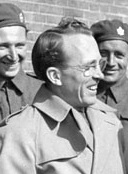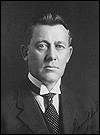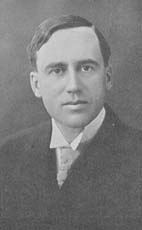|
Rosetown (provincial Electoral District)
Rosetown was a provincial electoral district for the Legislative Assembly of the province of Saskatchewan, Canada, centered on the community of Rosetown. Created before the 3rd Saskatchewan general election in 1912, this district was dissolved and combined with the Elrose constituency (as Rosetown-Elrose) before the 18th Saskatchewan general election in 1975. It is now part of a revived Rosetown-Elrose constituency. Members of the Legislative Assembly Election results , - , Conservative , Carnaby Willis Ferry , align="right", 804 , align="right", 44.64% , align="right", – , - bgcolor="white" !align="left" colspan=3, Total !align="right", 1,801 !align="right", 100.00% !align="right", , - , style="width: 130px", Conservative , William Thompson Badger , align="right", 2,151 , align="right", 45.46% , align="right", +0.82 , Independent , Thomas Alexander Sterling Campbell , align="right", 501 , align="right", 10.59% , align="right", – , - bgcolor="white" !align="lef ... [...More Info...] [...Related Items...] OR: [Wikipedia] [Google] [Baidu] |
List Of Saskatchewan Provincial Electoral Districts
Current electoral districts * Athabasca (1934) * Arm River (2016) * Batoche (2003) * Biggar-Sask Valley (2016) * Cannington (1995) * Canora-Pelly (1995) * Carrot River Valley (1995) * Cumberland (1975) * Cut Knife-Turtleford (2003) * Cypress Hills (1995) * Estevan (1975) * Humboldt-Watrous (2016) * Indian Head-Milestone (1995) * Kelvington-Wadena (1975) * Kindersley (1975) * Last Mountain-Touchwood (1975) * Lloydminster (1995) * Lumsden-Morse (2016) * Martensville-Warman (2016) * Meadow Lake (1934) * Melfort (2003) * Melville-Saltcoats (2003) * Moose Jaw North (1995) * Moose Jaw Wakamow (1991) * Moosomin (1905) * Prince Albert Carlton (1991) * Prince Albert Northcote (1991) * Regina Coronation Park (1995) * Regina Douglas Park (2003) * Regina Elphinstone-Centre (2003) * Regina Gardiner Park (2016) * Regina Lakeview (1995) * Regina Northeast (1995) * Regina Pasqua (2016) * Regina Rochdale (2016) * Regina Rosemont (2003) * Regina University (2016) * Reg ... [...More Info...] [...Related Items...] OR: [Wikipedia] [Google] [Baidu] |
John Taylor Douglas
John Taylor Douglas (October 28, 1892 – February 19, 1976) was a farmer and political figure in Saskatchewan. He represented Rosetown from 1944 to 1960 in the Legislative Assembly of Saskatchewan as a Co-operative Commonwealth Federation (CCF) member. He was born in Cumberland, Ontario, the son of John Douglas and Anne Welch, was educated there and came west with his family in 1906, settling in the Laura district of Saskatchewan. Douglas studied agriculture at the University of Saskatchewan and went on to farm near Laura. He was campaign manager for Major James Coldwell in 1935, when Coldwell was elected to the Canadian House of Commons for the CCF. He married Eva Hopkins in 1940. In 1941, Douglas became provincial organizer for the CCF. He unsuccessfully challenged Liberal MLA Neil McVicar in Rosetown at the 1938 general election, but was elected in 1944 Events Below, the events of World War II have the "WWII" prefix. January * January 2 – WWII: ** ... [...More Info...] [...Related Items...] OR: [Wikipedia] [Google] [Baidu] |
1944 Saskatchewan General Election
The 1944 Saskatchewan general election was held on June 15, 1944 to elect members of the Legislative Assembly of Saskatchewan. The election was held six years after the previous election. There is normally a five-year limit on the lifespan of Parliaments and provincial assemblies in Canada, but the emergency brought on by the Second World War allowed the government to delay the election temporarily. It marked the first time a socialist government was elected anywhere in Canada. Co-operative Commonwealth Federation (CCF) leader Tommy Douglas became the premier of the province. The CCF won 47 of the 52 seats in the legislature, and over half the popular vote, despite a very negative campaign by the governing Liberal Party. The Liberals, led by William John Patterson, accused Douglas of being a communist. The Liberal popular vote fell by 10 percentage points, and they won only five seats. It is still the worst defeat of a sitting government in Saskatchewan's history. The Socia ... [...More Info...] [...Related Items...] OR: [Wikipedia] [Google] [Baidu] |
1938 Saskatchewan General Election
The 1938 Saskatchewan general election was held on June 8, 1938, to elect members of the Legislative Assembly of Saskatchewan. The Liberal Party was returned to power under its new leader, William John Patterson, but it lost twelve of the seats it had held in the previous legislature. The Liberals faced several new forces in this election. The Co-operative Commonwealth Federation, a democratic socialist party led by George Hara Williams, became the official opposition winning over 18% of the vote and ten seats in its first election. The party previously had five seats after the Farmer-Labour Group became the Saskatchewan CCF following the previous election. The Social Credit Party of Saskatchewan, which promoted the social credit theories of monetary reform, rode a wave of popularity from the 1935 electoral success of its Alberta counterpart and collected almost 16% of the votes, but won only two seats. Six "Unity" candidates also ran in an attempt to create a popular front ... [...More Info...] [...Related Items...] OR: [Wikipedia] [Google] [Baidu] |
1934 Saskatchewan General Election
The 1934 Saskatchewan general election was held on June 19, 1934, to elect members of the Legislative Assembly of Saskatchewan. The Liberal Party of Saskatchewan, Liberal Party of former List of premiers of Saskatchewan, Premier James Garfield Gardiner, James Gardiner was returned to power with a large majority – 50 of the 55 seats in the legislature – after the four year Conservative minority government interlude. After forming a coalition government to oust the Liberals from power after the 1929 Saskatchewan general election, 1929 election, James Thomas Milton Anderson, James T.M. Anderson's Progressive Conservative Party of Saskatchewan, Conservative government had tried to use anti-Roman Catholic Archdiocese of Regina, Catholic and anti-Fransaskois, French Canadian feeling in the province to win support. The Conservatives also had the support of the Ku Klux Klan in Canada, Ku Klux Klan, which was a significant force in the province at the time.Weedmark, Kevin"When the KKK ... [...More Info...] [...Related Items...] OR: [Wikipedia] [Google] [Baidu] |
Economic Group (Saskatchewan)
The Economic Group was a political party that nominated candidates in the 1929 provincial election in the Canadian province of Saskatchewan. The party nominated three candidates for election to the Legislative Assembly of Saskatchewan. These candidates won 1,942 votes, which represented 0.54% of the provincial total. None of the candidates were elected. The party did not nominate candidates in subsequent elections. Principles and Policies The Economic Group supported ranked voting, a fuel tax to fund highway construction, and provincial health insurance Many of the Economic Group's policies were taken directly from the platform's of the Progressive Party of Saskatchewan and the Conservative Party of Saskatchewan during the 1929 election Including "sterilization of mental defectives" from the Progressive Party and a strict immigration policy Border control refers to measures taken by governments to monitor and regulate the movement of people, animals, and goods across ... [...More Info...] [...Related Items...] OR: [Wikipedia] [Google] [Baidu] |
1929 Saskatchewan General Election
The 1929 Saskatchewan general election was held on June 6, 1929 to elect members of the Legislative Assembly of Saskatchewan. As a result of corruption scandals, the Liberal Party of Premier James Gardiner lost a significant share of its popular vote, but more important, lost twenty-two of the seats it had won in the 1925 election. While the Liberals held the largest number of seats in the legislature, they had only a minority. Gardiner tried to continue as a minority government, but was quickly defeated in a Motion of No Confidence, and resigned as premier. The Conservative Party of James T.M. Anderson increased its representation in the legislature from three to twenty four seats. Following Gardiner's resignation, Anderson was able to form a coalition government with the support of the Progressive Party and some independents. The Progressives had lost a large part of the popular vote it had won in 1925, but managed to retain five of the six seats it had won previously. Resu ... [...More Info...] [...Related Items...] OR: [Wikipedia] [Google] [Baidu] |
James Cobban (Saskatchewan Politician)
James Cobban (November 24, 1870 – March 19, 1934) was a rancher and political figure in Saskatchewan. He represented Elrose from 1929 to 1934 in the Legislative Assembly of Saskatchewan as a Conservative. He was born in Middlemiss, Ontario (near London), the son of Alexander Cobban and Rebecca Plain, and came to western Canada in 1890. Cobham married Annie Campbell in 1902. Cobham ran unsuccessfully for the Middlesex West Middlesex West was a federal electoral district represented in the House of Commons of Canada from 1867 to 1968. It was located in the province of Ontario. It was created by the British North America Act of 1867 which divided the County of Midd ... seat in the Canadian House of Commons in 1911 and the Rosetown seat in the provincial assembly in 1925 before being elected for Elrose in 1929. He became ill while shipping cattle in the fall of 1933 and spent the winter in the hospital in Rosetown. Cobham travelled to Regina for the opening of the 1934 ... [...More Info...] [...Related Items...] OR: [Wikipedia] [Google] [Baidu] |
1925 Saskatchewan General Election
The 1925 Saskatchewan general election was held on June 2, 1925 to elect members of the Legislative Assembly of Saskatchewan. The Liberal Party of Saskatchewan – under its new leader, Charles A. Dunning – won its sixth consecutive victory, and continued to dominate the legislature. The Progressive Party of Saskatchewan increased its share of the vote from 7.5% to over 23%, but failed to add to its six member caucus. The Conservative Party of James Anderson also increased its vote by over 14%, but only increased its representation in the legislature from two to three members. The increase in the Progressive and Conservative vote came from voters who had supported independent candidates in the 1921 election. Results Note:* Party did not nominate candidates in previous election. Percentages Members elected For complete electoral history, see individual districts July 21, 1925 For complete electoral history, see individual districts See also * List of Saskatchewan po ... [...More Info...] [...Related Items...] OR: [Wikipedia] [Google] [Baidu] |
1921 Saskatchewan General Election
The 1921 Saskatchewan general election was held on June 9, 1921, to elect members of the Legislative Assembly of Saskatchewan. The Liberal Party of Saskatchewan of Premier William M. Martin was re-elected – although with a diminished share of the popular vote, and a reduced caucus in the legislature. The opposition Conservative Party – led by Donald McLean – fractured: it nominated only seven candidates, and won only two seats. Its share of the popular vote fell from about 36% to less than 4%. It appears that many Conservatives ran as independents or Independent Conservatives. These two groups won over 29% of the vote, and voters elected a total of eight Members of the Legislative Assembly (MLAs) under these banners. The Progressive Party of Saskatchewan made its first appearance, winning six of the seven ridings that it contested. Results Note: * Party did not nominate candidates in previous election. Percentages Members of the Legislative Assembly elected For c ... [...More Info...] [...Related Items...] OR: [Wikipedia] [Google] [Baidu] |
Independent Politician
An independent or non-partisan politician is a politician not affiliated with any political party or bureaucratic association. There are numerous reasons why someone may stand for office as an independent. Some politicians have political views that do not align with the platforms of any political party, and therefore choose not to affiliate with them. Some independent politicians may be associated with a party, perhaps as former members of it, or else have views that align with it, but choose not to stand in its name, or are unable to do so because the party in question has selected another candidate. Others may belong to or support a political party at the national level but believe they should not formally represent it (and thus be subject to its policies) at another level. In running for public office, independents sometimes choose to form a party or alliance with other independents, and may formally register their party or alliance. Even where the word "independent" is used, s ... [...More Info...] [...Related Items...] OR: [Wikipedia] [Google] [Baidu] |
1917 Saskatchewan General Election
The 1917 Saskatchewan general election was held on June 26, 1917, to elect members of the Legislative Assembly of Saskatchewan. After replacing Walter Scott as leader of the Liberal Party of Saskatchewan and premier of the province, William M. Martin led the party to its fourth consecutive victory, winning all but 8 of the 59 seats in the legislature. The Conservative Party of Wellington Willoughby continued to lose popular support. This was the first Saskatchewan election in which women were allowed to vote and run for office. However, none were declared elected in this vote; the first Saskatchewan woman elected an MLA was after a 1918 by-election. The Non-Partisan League, forerunner of the Progressive Party of Saskatchewan, nominated candidates for the first time, although none were successful. Labour candidates also appeared for the first time. David John Sykes became the first Independent to sit in the Saskatchewan legislature. He was nominated by the Liberal, Conservat ... [...More Info...] [...Related Items...] OR: [Wikipedia] [Google] [Baidu] |






